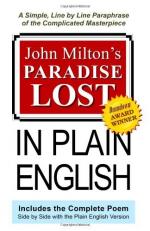|
This section contains 6,870 words (approx. 23 pages at 300 words per page) |

|
SOURCE: "Demystifying Disguises: Adam, Eve, and the Subject of Desire," in Renaissance Discourses of Desire, University of Missouri Press, 1993, pp. 237-58.
Martin explores the role of desire in Milton's depictions of Paradise.
On Milton's sociability:
One can imagine the blind poet visiting a coffee house to hear the Gazette read aloud and listen to the news from across the city. As his health worsened, perhaps he believed or hoped that coffee's medicinal properties could relieve his gout as its advertisements promised. Milton would clearly have appreciated the coffee houses' temperance: they did not serve alcohol during the Commonwealth, and many remained 'temperance establishments' at the Restoration. Whereas Parker envisions Milton 'dwelling apart, holding high converse with the best minds of the past', Milton's contemporaries portray a more outgoing man who enjoyed conversing with real people—the 'chief Scene' and 'main end' of visiting a coffee house. Milton's daughter...
|
This section contains 6,870 words (approx. 23 pages at 300 words per page) |

|


